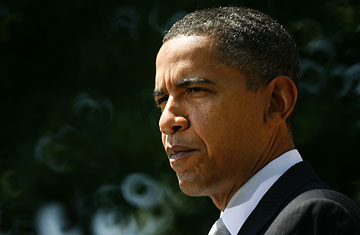
President Barack Obama delivers a speech in Washington, D.C., on June 11, 2010
Republicans didn't win everything they hoped for Tuesday night. But they took enough seats from the Democrats to gain control of the House, pick up Senate slots, wrest control of several state legislatures, create a solid gubernatorial stronghold in the Midwest and send an unmistakable message to Democrats: Much of the American public wants a check on the policies of Barack Obama, Harry Reid and Nancy Pelosi.
A lot will change now for President Obama. He will have to deal with a Speaker of the House from the other party and a Senate that is even more divided than before. His year of political pain and missteps has been punctuated by the unmistakably negative verdict of the voters. And he has suffered the first catastrophe of his national political career that calls into question his political judgment, long-term viability and his place in history.
There have already been weeks of speculation about how Obama should respond to Tuesday's long-anticipated results, and the pundits' guessing games will soon reach fever pitch. But no one outside the president's inner circle has much insight into what he will do. The most obvious model to follow — mimicking what Bill Clinton did after the 1994 midterm massacre — contains many elements that have not been part of the Obama modus operendi in the past. He has almost never brought in outsiders as key advisers, admitted ideological overreach, trimmed his sails or accepted broad strategic changes to plans already set in motion.
But for all the focus on what has changed for Obama — what adjustments he will need to make to survive the post-midterm world and the new-found attention that will surely be given to novel Republican leaders — some important factors remain the same. Obama is still the president, with half the balance of his term remaining. With that comes an unmatched ability to drive the agenda of the nation and the world, even if those advantages are meaningless when they go unexploited.
It has become common parlance to ask where Candidate Obama of 2008 went — the man with formidable political and communications skills. But compared to President Obama, that man had fewer determined opponents, a blanker canvas on which to paint his image and the greater freedom of movement that comes with a campaign. But while Obama might find some elements of his former self useful, this is a new situation. It requires a new Obama that exhibits the best of what we have seen before, but also displays some fresh elements. For the sake of his supporters, his political future and the nation, one should hope that the man who has resisted the very change he promised is ready to become something new.
